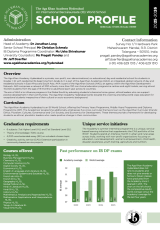Wellness Corner - It Is Ok To Not Be Ok
I feel obliged to start this month’s article by acknowledging just how much I have had to be grateful for these last 7 months. It started with getting the last international flight out of Hyderabad on March 22nd, returning to my native UK where I was welcomed ‘home’ at the airport by my family. With less than 24 hours notice, my parents had rallied together with my in-laws to create a make-shift home for my husband and I, a place where we could safely quarantine amidst the chaos of covid-19. I have had stable access to food sources throughout this time and somehow just about escaped those deeply unsettling weeks in UK supermarkets when shelves were empty and toilet paper bizarrely scarce. I have also experienced the huge generosity of friends, those that have open-heartedly given us a place to stay whilst we find ourselves stranded in Europe and those who have supervised the cleaning up of an immense rat infestation in our neglected home at the Academy! Whilst others have faced job insecurity and the financial woes that come as a result, I have managed to hold onto my job, a job that I love. For all this, I am exceptionally grateful.
And, at the same time, sometimes I am really not okay. When will we be able to get back to our home in India? When will I be able to work with students face-to-face again? When will I be able to hug my 70-year-old father without feeling that I am somehow putting him in danger? I am grateful and I am lucky. I am leaning into what I cannot control and learning to sit with the uncertainty. Sometimes, it is really hard and I am not okay.
I find that when I guilt myself into gratitude, my capacity for happiness is greatly diminished. Cultivating a positive mindset is a powerful coping mechanism. Toxic positivity, on the other hand, whereby we imagine that the only way to cope is by putting a positive spin on things is both counter-productive and harmful to our mental health. Indeed, when I work on cultivating gratitude from a place of “should” (“I should be feeling grateful”, “I shouldn’t be feeling sorry for myself”), I wind up feeling decidedly unhappy. Suppressing feelings of sadness and worry, forcefully shoving them under the carpet, only serves to make me more anxious. I tend to think of these feelings as toddlers, young children tugging on my clothes in a bid to get my attention. Any parent will know that when you ignore a toddler or give them a superficial toy to play with, they’re liable to start tugging harder (or screaming louder as is more often the case). Yet if you momentarily give them the attention they’re craving and relate to them with openness and curiosity, you satisfy their need to be seen. For me, so-called negative feelings are no different, they need to be deeply heard in order to calm down.
When talking to friends, children and students who are struggling with feelings of sadness or confusion, I invite you to acknowledge their pain without attempting to ‘fix’ the situation. There is a time to look on the bright side of life and it is almost always once we have acknowledged and made friends with the dark, not when we have beaten it into submission and silence. Instead of phrases like “don’t worry”, “try not to think about x” and “it’ll all be okay” try “that sounds really difficult”, “I’m sorry you’re experiencing x”, “I can hear you’re feeling scared/sad/worried”. While this can seem terrifying at first, indeed you might wonder how the person in front of you will ever calm down without you telling them to, you might be surprised at the human capacity to self-soothe. When we validate the feelings of the people around us, we move them away from feelings of “should”. “Should” tells us that what’s arising has no place and therefore, as Clinical Health Psychologist Natalie Dattilo says “we end up feeling bad about feeling bad”. When “should” takes over (“I should be more grateful” for example) it becomes impossible to heal the sadness or worry that was there in the first place. Telling someone “everything is fine” is to deny and minimise what is being shared with us, this tends to leave people feeling unheard, judged and lonely in their darkness. We need the support of community around us and we need the support from our inner-voice. It’s okay to not be okay.
Intrigued to read more about toxic positivity, check out Allyson Chiu’s recent article in Washington Post and for more tips on validating feelings of loved ones, see the table of phrases in this article from the Psychology Group.





